
Copyright Derek Voller and licensed for reuse under Creative Commons Licence
Today’s hymn from Sing Praise is one intended for the Remembrance season, so it is appropriate for today, 11th November when we have been remembering the victims of war. ‘Eternal God, before whose face we stand’ by Timothy Dudley-Smith is a traditional style of hymn by a modern composer, and set to a 19th century tune.
The first verse reminds us that [all] earthly children are made by God, who knows all our hearts and longings. On that basis we have confidence in praying for peace in the world. Peace can seem a hopeless ideal to those without faith, but faith in a loving God who answers prayer makes such prayers worthwhile.
The second verse acknowledges the mixture of feelings we may have when contemplating the soldiers of past conflicts: grief at their deaths, thankfulness for victory against enemies, pride in our armed forces (occasionally misplaced perhaps when scandals come to light, but often justified), loneliness and loss (felt most keenly by their immediate friends and relatives). These feelings we bring ‘to him who hung forsaken on the cross’, and indeed the whole tradition of Remembrance since 1919 is based on the Christian faith at the heart of most European cultures, that Christ was sacrificed for the sake of all humanity and not for one nation alone.
The third verse acknowledges the sin of war and makes a commitment to build an enduring peace across the world, and the last verse refers to that peace as a ‘fragile flower’. Indeed it is, as we so often see conflict re-emerging from a shallow peace, like the embers of a fire spontaneously re-igniting in a breeze. The final lines of the hymn look beyond our present earthly politics to the time when Christ shall renew all things: ‘When night is past and peace shall banish pain, all shall be well in God’s eternal reign’.